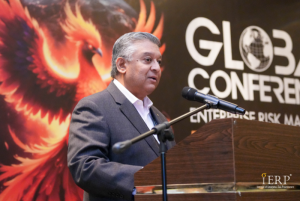If there is one thing that the Covid-19 Pandemic has taught us, it is that we are operating in an uncertain environment. But change, disruption and uncertainty notwithstanding, life has to go on; businesses have to learn how to cope with the challenges of the New Normal. And one of the ways of doing this is to manage external stimuli through the talent of the organisation. In her session “Advancing Talent Management During and After the Pandemic,” Rowena Florece, HR Lead for Microsoft Canada, focused on how the workplace was changing, and how we needed to look at and think about talent management differently.
“A leader who is holding an organisation together in this environment has multiple commitments to consider,” she said. “You have a commitment to your customers, to the market and to leading groups of people.” In an environment as fluid as the one we are now in, there is a myriad of perspectives to consider. Changes in the environment trigger the way people work, and direct the kinds of skills they need, to keep up with dynamic demands. Florece’s presentation was based primarily on her experiences at Microsoft and incorporated industry research carried out by the tech giant. She said that companies looking for sustainability have to consider several trends that this research has shown.
The areas that have come under scrutiny include the skills economy; augmented humanity; diversity and inclusiveness; purpose, culture and company stance; and fluidity and flexibility. Workers need to upskill constantly to stay relevant and efficient. For this, they need to leverage on technology, which can augment the skills they already have.
“The economy today is about skills,” she pointed out. “And the skillset needed today is very different from the traditional one. There is a need to retrain or reskill the workforce to adapt to the changing environment. We have to augment the way we work with technology.”
Diversity and diverse opinions have to be incorporated into everything the organisation undertakes. Diversity and inclusion are really everyone’s responsibility. “Employees need to feel the purpose of the organisation,” she said. “The purpose of the organisation must resonate with the employee. Culture is the currency of the organisation.” Remarking that people often leave an organisation because they don’t like the culture, she said that ways of working were becoming more fluid, often shifting from formal and full-time to dynamic and flexible. Teams therefore have to get used to new ways of working.
How do organisations find these much-needed, multi-faceted talents which will lead their firms into the future? While everyone has the potential to lead, she said organisations have to foster key traits that are critical to them, and identify who can take on different roles, move up in the organisation or move to different areas where they can be more effective. She cited Talent Talks, a Microsoft method of brainstorming ways to augment skills, build experiences and encourage innovation in the company. Having a programme like Talent Talks gives the whole organisation the opportunity to see what talent is in the firm, gauge potential, and make employees a part of the talent conversation.
Programmes like these often have the effect of breaking down silos as well, as the firm identifies ways for its personnel to be retrained, upskilled or further developed. Along the way, the firm also needs to identify leaders, bearing in mind that leadership needs to create clarity, generate energy and deliver success. Leaders will have to be able to synthesise the complex, and ensure shared understanding of the organisation’s goals. They should be able to clearly define a course of action while inspiring optimism, creativity and growth, ultimately creating an environment where everyone does their best work.
Acknowledging that culture change is hard, she reiterated nevertheless that talent will grow, given the right culture but it has to be accompanied by a growth mindset and the willingness to embrace failure, learn from it and become better. “When a person feels that they know everything, that’s when the growth stops!” she cautioned.
“You have to always be learning. Diversity and inclusion mean that everyone can contribute to the organisation regardless of their orientation. It is thus reflective of the market that is being served.” Outlining ways that tech can accelerate culture change, she advocated “screening in” rather than “screening out” when interviewing candidates.
This, she said, will enable organisations to include candidates that may not have skills for the job but have other experiences which may benefit the company in other areas. Screening in also spurs a more diverse workforce as it will inevitably include people who are “not like us.” New hires can give different perspectives. Employees who are thus empowered to learn and develop “growth mindsets” are likely to create a skilled talent pool for the organisation to draw on. In turn, the firm should give them what they expect, through a process of “keeping score” and being constantly in touch with employee sentiment.
Tech and culture meld when an organisation’s talent is engaged with their jobs, and when that talent can be successfully retained. “A growth mindset is integral to the growth of the organisation,” she stated. “People need to challenge themselves to do more. Leaders should speak more directly to employees to understand employee sentiments better.” Today’s environment needs constant change management and transformation; organisations cannot afford to stop. The pandemic can actually accelerate the transformation, she pointed out, but firms need to “have a people perspective. It’s the only way to deal with human resources,” she concluded.


























